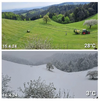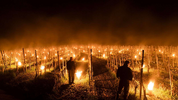Okay, so I'm wondering about something from ice age material in the sessions. Rebound has been mentioned a few times in the sessions.
[...]
So yeah, basically I'm not sure how else to interpret the idea that the world's climate was not much colder away from the ice sheets. I'm guessing that there are very different ways to start an ice age.
[..]
A few articles come to mind which may be of interest, if you haven't seen them already:
They're focused on Europe, and are regarding the speed of onset, and what conditions may have proceeded - i found them interesting because they seemed congruent with some of the commentary in the sessions:
(2021)
Little Ice Age triggered by unusually warm period, unprecedented cold struck within 20 years

Little Ice Age triggered by unusually warm period, unprecedented cold struck within 20 years
New research from the University of Massachusetts Amherst provides a novel answer to one of the persistent questions in historical climatology, environmental history and the earth sciences: what caused the Little Ice Age? The answer, we now know,...www.sott.net
', they noticed something surprising: a sudden change from very warm conditions in the late 1300s to unprecedented cold conditions in the early 1400s, only 20 years later [...]
Ice Age summers in Europe 20,000+ years ago: (2022)
Ice Age summers in Central Europe were at times significantly WARMER than previously thought, new research reveals

Ice Age summers in Central Europe were at times significantly WARMER than previously thought, new research reveals
New method for determination of past climate data on land applied comparatively for the first time / Ice Age summers in Central Europe were at times warmer than previously known Scientists from an international research project led by Johannes...www.sott.net
"Analysis of the data obtained from the ECGs shows that from 45,000 to 22,000 years before present it was much drier in Central Europe than it is today, with up to 70 percent less humidity," said Dr. Charlotte Prud'homme from the University of Lausanne, the study's lead author. "This allows us for the first time to quantify previous findings about this period." The novelty in these investigations on ECGs is that summer temperatures at the time were significantly higher than previously thought. "Although summers during the cold maximum of the last glacial were about four to eleven degrees Celsius colder than today, they were only one to four degrees below the values of short milder climatic phases that occurred during the last glacial," explained Fischer. "Given these summer temperatures, we cannot exclude that Ice Age human populations may have made a seasonal living in Central Europe during the cold maximum, at a time for which it is generally assumed that humans could not survive here," added Dr. Olaf Jöris of Römisch-Germanisches-Zentralmuseum, who was also involved in the study.
Rainfall patterns, flooding, and Ice Ages: (2020)

Ice Age summers in Central Europe were at times significantly WARMER than previously thought, new research reveals
New method for determination of past climate data on land applied comparatively for the first time / Ice Age summers in Central Europe were at times warmer than previously known Scientists from an international research project led by Johannes...www.sott.net
Highest flooding in Europe for 500 years, historical records show correlation with abnormal cold
The data analysis identified nine periods of floods that were more abundant and the associated regions. Among the most notable periods are 1560-1580 (western and central Europe), 1760-1800 (most part of Europe), 1840-1870 (western and southern Europe), and 1990-2016 (western and central Europe). According to the analysis, the current phase is the third most severe regarding floods"In our previous studies, especially those focused on alpine basins with glacial presence, we knew there was a high number of flood periods in the past that coincided with cold climate abnormalities"These results seem to contradict the observation which states that in some areas, such as northern-eastern Europe, the recent warm weather is aligned with severe floods.
The seasonality of floods within the year has changed as well. Previously, the 41% of floods in central Europe took place in summer, compared to the nowadays' 55%.



